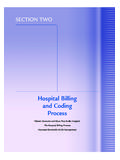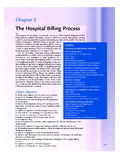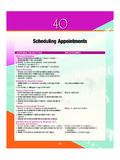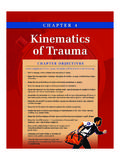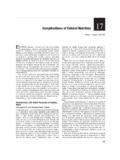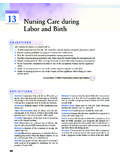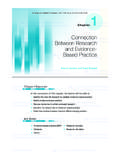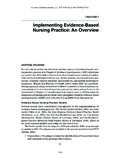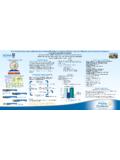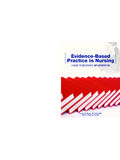Transcription of 6 Nursing Research and Evidence-Based Practice
1 CHAPTER. 6 Nursing Research and Evidence-Based Practice Jill J. Webb, PhD, MSN, RN, CS. Additional resources are available online at: Nursing Research provides the foundation for Evidence-Based Nursing Practice . VIGNETTE. I did not understand why I had to take a Research class when all I wanted to do was be a staff nurse in a critical care unit. Research ? Evidence-Based Practice ? Why are these topics in the Nursing program? I have enough to do just learning all the content in my clinical courses. What do Research and evidence have to do with developing my Nursing abilities?
2 I trust the faculty, the textbooks, and clinical experience to prepare me for Nursing . I'm already getting what I need to know. That was my earlier attitude. Now that I am practicing, I have a new appreciation for nurs- ing Research and the evidence it provides for application to Practice . I have an entirely different way of addressing clinical questions. I'm starting to ask questions about how I can improve the care I give to patients and how I can be involved in my workplace's efforts to improve care for the patients it serves.
3 I have discovered by purposeful reading in my Practice area that Research reports and Research summaries contain many implications that apply to Practice in the critical care unit. QUESTIONS TO CONSIDER WHILE READING THIS CHAPTER: 1 How can faculty encourage students to read Research journals? 2 How does Research affect Nursing Practice ? 3 How can nurses motivate colleagues to base their Practice on Research ? KEY TERMS. Clinical nurse researcher (CNR) An advanced Practice nurse who is doctorally prepared and directs and participates in clinical Research .
4 Clinical nurse specialist (CNS) An advanced Practice nurse who provides direct care to clients and participates in health education and Research . Clinical Practice guideline (CPG) an Evidence-Based guide to clinical Practice developed by experts in a particular field for direct application in clinical environments. Control group Subjects in an experiment who do not receive the experimental treatment and whose performance provides a baseline against which the effects of the treatment can be measured. When a true experimental design is not used, this group is usually called a comparison group.
5 Data collection The process of acquiring existing information or developing new information. 104. Nursing Research and Evidence-Based Practice CHAPTER 6 105. Empirical Having a foundation based on data gathered through the senses ( , observation or experience) rather than purely through theorizing or logic. Ethnography A qualitative Research method for the purpose of investigating cultures that involves data collection, description, and analysis of data to develop a theory of cultural behavior. Evidence-Based Practice The process of systematically finding, appraising, and using Research findings as the basis for clinical Practice .
6 Experimental design A design that includes randomization, a control group, and manipulation between or among variables to examine probability and causality among selected variables for the purpose of predicting and controlling phenomena. Generalizability The inference that findings can be generalized from the sample to the entire population. Grant Proposal developed to seek Research funding from private or public agencies. Grounded theory A qualitative Research design used to collect and analyze data with the aim of developing theories grounded in real-world observations.
7 This method is used to study a social process. Meta-analysis Quantitative merging of findings from several studies to determine what is known about a phenomenon. Methodologic design A Research design used to develop the validity and reliability of instruments that measure Research concepts and variables. Naturalistic paradigm A holistic view of nature and the direction of science that guides qualitative Research . Needs assessment A study in which the researcher collects data for estimating the needs of a group, usually for resource allocation.
8 Phenomenology A qualitative Research design that uses inductive descriptive methodology to describe the lived experiences of study participants. Pilot study A smaller version of a proposed study conducted to develop or refine methodology, such as treatment, instruments, or data collection process to be used in a larger study. Qualitative Research A systematic, subjective approach used to describe life experiences and give them meaning. Quantitative Research A formal, objective, systematic process used to describe and test relationships and examine cause-and-effect interactions among variables.
9 Quasi-experimental Research A type of quantitative Research study design that lacks one of the components (randomization, control group, manipulation of one or more variables) of an experimental design. Randomization The assignment of subjects to treatment conditions in a random manner (determined by chance alone). Secondary analysis A Research design in which data previously collected in another study are analyzed. State-of-the-science summary A merging of findings from several studies concerning the same topic. Examples include meta-analysis with a quantitative approach and integrative review with a descriptive approach.
10 Survey A nonexperimental Research design that focuses on obtaining information regarding the status quo of a situation, often through direct questioning of participants. Triangulation The use of a variety of methods to collect data on the same concept. LEARNING OUTCOMES. After studying this chapter, the reader will be able to: 1 Summarize major points in the evolution of Nursing Research in relation to contemporary Nursing . 2 Evaluate the influence of Nursing Research on current Nursing and health care practices . 3 Differentiate among Nursing Research methods.

